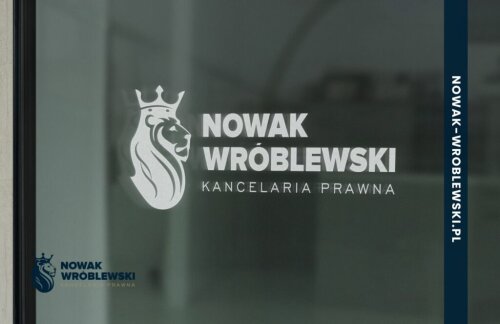Best Commercial Real Estate Lawyers in Tarnobrzeg
Share your needs with us, get contacted by law firms.
Free. Takes 2 min.
Free Guide to Hiring a Real Estate Lawyer
List of the best lawyers in Tarnobrzeg, Poland
1. About Commercial Real Estate Law in Tarnobrzeg, Poland
Commercial Real Estate (CRE) law in Tarnobrzeg covers the legal framework for buying, selling, leasing, financing, and developing business properties such as offices, retail spaces, warehouses, and development sites. Local CRE matters combine national civil and property law with municipal planning rules administered by Tarnobrzeg’s city authorities. Practitioners frequently navigate land and mortgage records, lease negotiations, and planning permissions when advising clients in Tarnobrzeg.
In Tarnobrzeg, property transactions typically involve due diligence to verify ownership and rights in the Land and Mortgage Register, review of the local zoning or development plan, and alignment with municipal building regulations. A Polish attorney or legal counsel (adwokat or radca prawny) plays a key role in drafting agreements, interpreting local plans, and coordinating with notaries for property transfers. Understanding both national rules and Tarnobrzeg's local procedures helps prevent title issues and regulatory delays.
2. Why You May Need a Lawyer
Below are concrete, real-world scenarios where residents or businesses in Tarnobrzeg commonly seek Commercial Real Estate legal help. Each example reflects typical local contexts and practical outcomes.
- Drafting or negotiating a commercial lease for a shop on Tarnobrzeg’s market streets to ensure rent indexation terms are clear and enforceable.
- Reviewing a due diligence package before purchasing a warehouse in Tarnobrzeg, including verification of the Księga Wieczysta (Land and Mortgage Register) and encumbrances.
- Resolving a dispute over a non-performance clause in a multi-tenant office building lease and seeking timely remedies without disrupting operations.
- Advising on zoning compliance for a new showroom development in Tarnobrzeg and obtaining necessary permits from the Municipal Office.
- Negotiating mortgage financing for a commercial property and coordinating with lenders on security interests and early repayment terms.
- Addressing property tax, VAT, or amortization questions tied to commercial premises used for business operations in Tarnobrzeg.
3. Local Laws Overview
Commercial Real Estate activity in Tarnobrzeg is governed by a set of national statutes that shape local practice. Here are 2-3 key laws and what they regulate, with context for Tarnobrzeg and its planning environment.
- Kodeks cywilny (Civil Code) - the foundational statute governing contracts, property rights, and leases. It provides the baseline rules for commercial tenancy, landlord rights, and remedies for breach. This code applies to most CRE transactions in Tarnobrzeg and across Poland. Source: ISAP - Internetowy System Aktów Prawnych
- Ustawa o gospodarce nieruchomościami (Real Estate Management Act) - governs the management and disposal of real estate owned by public authorities and the handling of real property transactions that may involve municipalities, including Tarnobrzeg. The act informs procedures for transfer, lease, and survival of property interests in municipal hands. Source: ISAP
- Ustawa o planowaniu i zagospodarowaniu przestrzennym (Planning and Spatial Development Act) - regulates land use, zoning, and development rights. This law governs how properties may be used and what permissions are required for construction or alteration of commercial spaces in Tarnobrzeg. Source: ISAP
(Local planning practices in Tarnobrzeg are implemented via the city’s Municipal Development Plan and local zoning documents. For property-specific planning questions, consult Tarnobrzeg City Hall and review the local plan for the parcel in question.)
“The Księga wieczysta (Land and Mortgage Register) provides public notice of property rights and encumbrances; it is essential for any CRE transaction.” Elektroniczna Księga Wieczysta
The Civil Code forms the backbone of contracts and property rights used in commercial leases and transfers in Poland. See ISAP for official text and amendments.
4. Frequently Asked Questions
What is a commercial lease and who signs it?
A commercial lease is a contract for renting business space. In Poland a lease is typically signed by the property owner or their agent and the business tenant, often with a notarial form for certain terms.
How do I verify a property’s ownership before purchase in Tarnobrzeg?
Check the Land and Mortgage Register (Księga wieczysta) and obtain a copy from the local court via the electronic register. Verify encumbrances, easements, and rights of way before closing.
When should I hire a CRE lawyer in Tarnobrzeg?
Engage a lawyer as soon as you start negotiating a lease or evaluating a property purchase. Early legal review reduces risk of hidden charges or unenforceable terms.
Where can I find official laws governing real estate in Poland?
Use the Internetowy System Aktów Prawnych (ISAP) for official Polish statutes and amendments. Link: ISAP portal.
Why might zoning affect my development project in Tarnobrzeg?
Zoning determines permitted land uses and building parameters. If a project conflicts with local plans, permits can be delayed or denied, affecting timelines and costs.
Can I negotiate rent increases in a commercial lease for Tarnobrzeg premises?
Yes, you can negotiate caps on annual increases, indexing methods, and renewal options to create stability and predictability for your business expenses.
Should I obtain a title search before buying commercial property?
Yes. A title search confirms ownership and reveals any rights of ownership, liens, charges, or third-party claims affecting the property.
Do I need a notary for a commercial property transfer?
In Poland, property transfers typically involve a notary to prepare the sale agreement and a separate deed for the registration at Księga Wieczysta, depending on the transaction type.
Is financing a CRE purchase subject to specific Polish rules?
Yes. Lenders may require a due diligence package, a clear title, and compliance with planning and environmental requirements before approving financing.
How long does it typically take to complete a CRE transaction in Tarnobrzeg?
Most purchases take 4-12 weeks for due diligence, negotiations, notarial deeds, and registration, though complex developments can take longer.
What costs should I budget besides the purchase price?
Expect legal fees, notary costs, land register fees, taxes, and potential planning or permit expenses that can add to the total cost.
5. Additional Resources
- Internetowy System Aktów Prawnych (ISAP) - official portal for Polish statutes and amendments; essential for verifying the exact text of CRE-related laws. ISAP
- Elektroniczna Księga Wieczysta (EKW) - online access to the Land and Mortgage Register for property title and encumbrances; used in due diligence. EKW
- Główny Urząd Statystyczny (GUS) - official statistics relevant to commercial real estate markets in Poland; helps benchmark rents and demand. GUS
6. Next Steps
- Define your CRE objective clearly and choose the type of property (office, retail, warehouse) and the Tarnobrzeg district to target. Set a realistic budget and timeline.
- Gather preliminary documents and identify a local CRE lawyer or legal counsel (adwokat or radca prawny) with Tarnobrzeg experience. Request a fee estimate and availability for an initial consult.
- Arrange an initial consultation with the lawyer to review the property, proposed lease or purchase terms, and due diligence plan. Bring the property address, draft contract, and any plan documents.
- Run due diligence with your lawyer: review Księga wieczysta, encumbrances, and confirm zoning compliance using the local plan and MPZP documents.
- Negotiate key terms with the other party and the lawyer, focusing on rent, duration, renewal, assignment, and termination rights, as well as permits and environmental considerations.
- Involve a notary where required for property transfers and ensure registration with the Land and Mortgage Register upon closing.
- Finalize financing arrangements, coordinate with lenders, and obtain necessary tax and regulatory approvals before taking possession.
Lawzana helps you find the best lawyers and law firms in Tarnobrzeg through a curated and pre-screened list of qualified legal professionals. Our platform offers rankings and detailed profiles of attorneys and law firms, allowing you to compare based on practice areas, including Commercial Real Estate, experience, and client feedback.
Each profile includes a description of the firm's areas of practice, client reviews, team members and partners, year of establishment, spoken languages, office locations, contact information, social media presence, and any published articles or resources. Most firms on our platform speak English and are experienced in both local and international legal matters.
Get a quote from top-rated law firms in Tarnobrzeg, Poland — quickly, securely, and without unnecessary hassle.
Disclaimer:
The information provided on this page is for general informational purposes only and does not constitute legal advice. While we strive to ensure the accuracy and relevance of the content, legal information may change over time, and interpretations of the law can vary. You should always consult with a qualified legal professional for advice specific to your situation.
We disclaim all liability for actions taken or not taken based on the content of this page. If you believe any information is incorrect or outdated, please contact us, and we will review and update it where appropriate.










